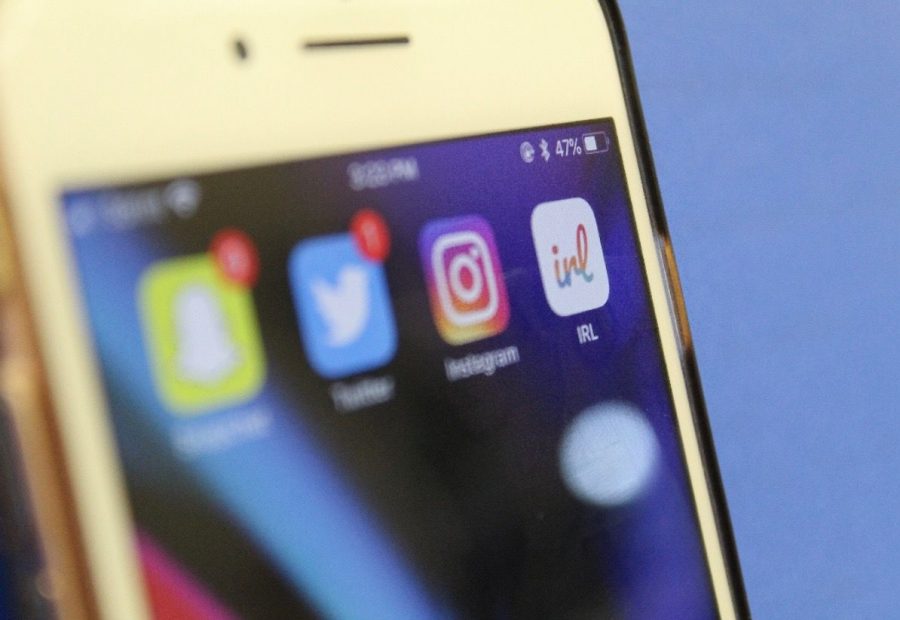Dangers of the internet: ‘Someone complimented you IRL’
September 3, 2018
What began as an effort to end technology addiction amongst teenagers, the IRL – Let’s Hang app, has caused dismay within the digital world. App developer Genrikh Khachatryan created IRL, which stands for in real life, with hopes of boosting its users’ self confidence by taking away the anxiety and social pressure of inviting friends to hang out in person. Although Khachatryan had good intentions, society was rubbed the wrong way when the app started spamming individuals with random text messages, claiming someone had given them a compliment. To make matters even worse for the apps reputation, a viral tweet implied the app was used as a mechanism to promote sex trafficking.
The viral tweet that stirred the pot for the situation claimed that if you opened the link that was sent by the app, you would be traced and potentially put up for sex trafficking. “LADIES, if you have received a text recently saying ‘a friend has complimented you in IRL’ With a link attached below it, DO NOT open the link! it is linked to sex trafficking. All your information, (including location) can be taken simply by clicking on the link. SO DON’T DO IT!”, the tweet read. This became a big deal within and outside of Twitter, making individuals even more worried than they already were about the whole situation.
“It’s scary,” said Tranise Marshall, sophomore at Washburn University. “It feels like someone is following me cause it’s consistently sending text messages to my phone number.” Marshall isn’t the only one who has been spooked. Many students at washburn have said they’ve gotten an average of three texts a week from the app.
Fortunately, further investigation revealed that the viral tweet was satire and the app is not linked to sex trafficking.
“The app enables users to send compliments in an effort to give them the confidence to make plans, according to CNBC, but if IRL is guilty of anything, it is executing an irritatingly aggressive marketing strategy. That should be no surprise, as the creators of IRL have previously been accused of auto-spamming users’ contacts for an app called Gather,” said Melanie Ehrenkranz in a Gizmodo article.
The burdensome amount of texts that individuals without the app receive come because of three reasons, according to the IRL – Let’s Hang FAQ page: one of your friends (who has your phone number in their contacts list) added you as a friend on the app invited you to something on the app, or nominated you through the app. This implies that the app is getting your contact information through contacts you already have established in your phone.
Now the question of how unsafe it is to have an app gather information like contacts and location arises. IRLs privacy policy makes it clear that, to be able to use their services, you’re going to have to give up some information of your own. Users are required to provide their phone number, E-mail, contact book and name to get registered in the app. After that information is gathered in the system ,the company states that it may collect “General and non-personal information” such as: your interests, gender, location, certain browser information and certain information about your mobile device.
“I think it’s extremely unsafe for an app to just have that information on file for them to use freely without your permission,” said Emma Faulkner, sophomore at Washburn University.
Faulkner is not the only one who finds IRL’s privacy policy hazardous. Pam Dixon, executive director of the world Privacy forum, called the app “somewhat predatory.”
IRLs’ sex trafficking rumors were a bust, but there are many ways predators find their victims through mobile devices. Popular social media apps such as Instagram, Twitter and Facebook have had many overlooked human trafficking incidents. Officer Kent Barmann, with the Washburn police department, offered some tips on how to stay safe on the internet. “First of all, don’t click on anything that you don’t already know of, a lot of links will lead you to spam websites, and the more you click the deeper you get. Also, check a user that you’re not familiar with account before you interact with them. If they have no content on their page but a million followers, that should be seen as a red flag. Lastly make sure you’re not putting everything you do down to the exact date, time, and location on your social media”.
Ultimately, no one is safe from the dangers of the internet. It’s never a bad idea to be cautious while putting your information into any site on your mobile device or computer. If you have any concerns about your safety while using an app be sure to do some background research, try to get in touch with the app developers or seek help from someone who has the authority to make a difference.




